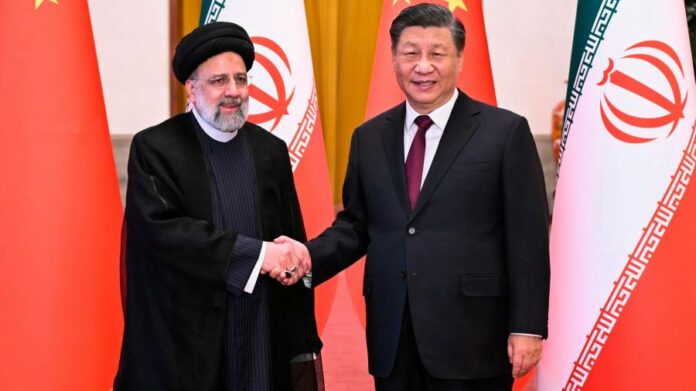China’s president Xi Jinping has vowed to step up trade and investment co-operation with Iran and “constructively participate” in efforts to revive its nuclear deal with world powers, as he sought to reassure Tehran about the two nations’ bilateral relationship.
During a visit on Tuesday to Beijing by Iran’s president Ebrahim Raisi — the first such trip by an Iranian leader in more than 20 years — Xi said: “No matter how the international and regional situation changes, China will unswervingly develop friendly co-operation with Iran and promote the development of [the] China-Iran comprehensive strategic partnership.”
Raisi’s three-day visit to Beijing comes as a bilateral 25-year co-operation deal signed in 2021 has failed to deliver economic benefits expected by Tehran. Xi’s push to deepen ties with Iran’s regional rivals such as Saudi Arabia has also rattled the Islamic Republic.
During the meeting with his Chinese counterpart, Raisi said the two countries’ relations were “moving forward” but that “what has been done is still behind what should have been done”, according to Iranian media.
“After the two countries signed this agreement in 2021, the relationship has not yet achieved a breakthrough,” said Fan Hongda, an Iran expert at Shanghai International Studies University. “Some Iranian officials have expressed dissatisfaction with China’s investment in Iran. At present, the most urgent need in Iran is economic development. Therefore, the more Chinese investment the better.”
According to a readout of the meeting with Raisi, Xi said China was willing to work with Iran to implement the 2021 deal, “deepen practical co-operation in trade, agriculture, industry, infrastructure and other fields, and import more high-quality Iranian agricultural products”.
Raisi was accompanied by his ministers for economy, oil, mining and agriculture as well as the top nuclear negotiator Ali Bagheri Kani.
One area of concern for Tehran is Iran’s oil sales to China. There has been widespread speculation that Beijing could increase purchases from Russia and buy less from Iran as western sanctions imposed over the Ukraine war put pressure on Moscow to find alternative customers for its oil.
The growing tensions between Washington and Beijing give China an incentive to further strengthen ties with Tehran, analysts say. Xi on Tuesday said: “China supports Iran in safeguarding national sovereignty and resisting unilateralism and bullying.”
Fan said: “The current US sanctions are one of the core factors affecting China’s exchanges with Iran. If the US continues to impose increasingly severe sanctions on some countries, these sanctioned countries may also have to seek co-operation with each other.”
But while China and Iran are expected to sign economic agreements in Beijing, Chinese analysts expressed doubts that they would bring firm commitments.
“One reason implementation of the . . . co-operation agreement has not moved as fast as Iran may have hoped is the state of relations between Iran and the US,” said Ma Xiaolin, director of the Institute for Studies on the Mediterranean Rim at Zhejiang International Studies University. “Chinese companies and the Chinese government cannot not be cautious when it comes to violating US sanctions, because China-US relations are the most important.”
On the 2015 nuclear accord between Tehran and world powers, Xi said China would “continue to constructively participate in the negotiations” on reviving “the implementation of the comprehensive agreement on the Iranian nuclear issue, support Iran in safeguarding its legitimate rights and interests and promote the early and proper resolution of the Iranian nuclear issue”.
The EU has been brokering indirect talks between the US president Joe Biden’s administration and Tehran in the hope of saving the nuclear pact, which former US president Donald Trump unilaterally abandoned in 2018. But there have been no discussions since September, when Iran was blamed for rejecting a draft proposal to revive the accord that had been agreed by the other signatories.
Western diplomats have been sceptical about the prospects of reviving the deal. But Chinese analysts say there is a chance.
“China delivered a big impetus to the deal in 2015. While several other powers have changed their stance, China has not and is therefore in a position to work on the other parties to revive the deal,” Ma said. “There is an opportunity because destroying the Non-Proliferation Treaty is of no use to anyone.”






